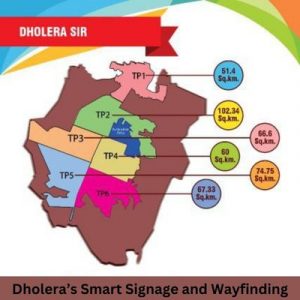Dholera, a city being developed as a part of India’s ambitious Smart Cities Mission, is set to become a pioneer in integrating advanced technologies to provide efficient, sustainable, and citizen-centric services. Among these technologies, Artificial Intelligence (AI) stands out as a transformative force poised to revolutionize various aspects of urban living. This blog explores the multifaceted role of AI in enhancing Dholera’s services, ranging from smart infrastructure and efficient utility management to advanced healthcare and personalized education.
AI in Smart Infrastructure
Intelligent Traffic Management
One of the critical areas where AI can significantly impact is traffic management. By utilizing real-time data from various sources such as traffic cameras, sensors, and GPS devices, AI can optimize traffic flow, reduce congestion, and improve road safety. AI algorithms can analyze traffic patterns, predict peak traffic times, and suggest alternative routes, thereby minimizing travel time for residents and reducing the carbon footprint of the city.
Smart Buildings and Energy Management
AI-powered systems in smart buildings can optimize energy consumption, enhance security, and improve overall building management. For instance, AI can regulate lighting and heating systems based on occupancy, predict maintenance needs, and even manage emergency responses. By integrating AI with the Internet of Things (IoT), Dholera can achieve significant energy savings and provide a more comfortable and secure living environment for its residents.
AI in Utilities Management
Water Supply and Waste Management
Efficient water supply and waste management are crucial for any smart city. AI can play a vital role in monitoring water quality, predicting demand, and managing distribution networks. Machine learning algorithms can analyze historical data to forecast water usage patterns, detect leaks, and ensure optimal water distribution. In waste management, AI can improve waste segregation, optimize collection routes, and enhance recycling processes, contributing to a cleaner and more sustainable city.
Power Grid Management
AI can enhance the reliability and efficiency of power grids in Dholera. By predicting energy demand and integrating renewable energy sources, AI can help manage the supply and demand balance, reduce energy wastage, and lower operational costs. AI algorithms can also detect and respond to faults in the grid, ensuring a stable and uninterrupted power supply to residents and businesses.
AI in Healthcare
Predictive Analytics and Disease Prevention
AI has the potential to revolutionize healthcare services in Dholera by enabling predictive analytics and disease prevention. By analyzing large datasets from electronic health records, wearable devices, and other sources, AI can identify patterns and predict outbreaks of diseases. This allows healthcare providers to implement preventive measures, allocate resources more effectively, and reduce the burden on healthcare facilities.
Personalized Medicine and Telehealth
Personalized medicine, powered by AI, can provide tailored treatment plans based on an individual’s genetic makeup, lifestyle, and medical history. AI algorithms can analyze patient data to recommend the most effective treatments, minimize side effects, and improve patient outcomes. Additionally, AI-driven telehealth services can enhance access to medical care, especially in remote areas, by enabling virtual consultations, remote monitoring, and real-time diagnosis.
AI in Education
Adaptive Learning Systems
AI can transform education in Dholera by providing personalized learning experiences. Adaptive learning systems use AI algorithms to assess a student’s strengths and weaknesses and tailor educational content accordingly. This ensures that each student receives the right level of challenge and support, enhancing learning outcomes and engagement.
Smart Classrooms and Educational Administration
AI can also enhance the efficiency of educational administration and create smart classrooms equipped with advanced technologies. For instance, AI can automate administrative tasks such as grading and attendance tracking, allowing teachers to focus more on instruction. In smart classrooms, AI-powered tools can facilitate interactive and immersive learning experiences, making education more engaging and effective.
AI in Public Safety and Security
Surveillance and Crime Prevention
AI can significantly enhance public safety and security in Dholera through advanced surveillance and crime prevention systems. AI-powered cameras and sensors can monitor public spaces, detect suspicious activities, and alert authorities in real time. Machine learning algorithms can analyze crime patterns and predict potential hotspots, enabling law enforcement agencies to deploy resources more effectively and prevent criminal activities.
Emergency Response Management
AI can improve emergency response management by providing real-time data analysis and decision support. In the event of a disaster, AI systems can analyze data from various sources, predict the impact, and suggest optimal response strategies. This can help emergency services respond more quickly and effectively, minimizing damage and saving lives.
AI in Transportation
Autonomous Vehicles
Dholera is poised to become a hub for autonomous vehicles, thanks to its advanced infrastructure and technology-friendly policies. AI plays a crucial role in enabling self-driving cars by processing data from sensors, cameras, and GPS systems to navigate roads, avoid obstacles, and ensure passenger safety. Autonomous vehicles can reduce traffic accidents, lower emissions, and provide convenient transportation options for residents.
Smart Public Transportation
AI can enhance public transportation services by optimizing routes, schedules, and fleet management. By analyzing data on passenger demand and traffic conditions, AI can improve the efficiency and reliability of public transit systems. AI-powered applications can provide real-time updates to commuters, helping them plan their journeys more effectively and reducing waiting times.
AI in Environmental Monitoring and Sustainability
Air Quality Monitoring
AI can play a crucial role in monitoring and improving air quality in Dholera. AI algorithms can analyze data from air quality sensors to detect pollutants, predict air quality trends, and identify sources of pollution. This information can help policymakers implement effective measures to reduce pollution and protect public health.
Climate Resilience
AI can also contribute to climate resilience by predicting and mitigating the impact of extreme weather events. Machine learning models can analyze historical weather data and current conditions to forecast floods, droughts, and other climate-related events. This allows the city to take proactive measures, such as reinforcing infrastructure and implementing early warning systems, to protect residents and minimize damage.
AI in Citizen Engagement and Governance
E-Government Services
AI can streamline e-government services by automating administrative processes, improving service delivery, and enhancing citizen engagement. AI-powered chatbots can provide instant responses to citizen inquiries, guide them through various services, and even assist in completing forms. This can significantly reduce waiting times and improve the overall efficiency of government services.
Participatory Governance
AI can also facilitate participatory governance by analyzing citizen feedback and social media data to gauge public sentiment and identify emerging issues. This enables city officials to make data-driven decisions, address citizen concerns more effectively, and foster a more inclusive and transparent governance model.
Challenges and Considerations
Data Privacy and Security
The integration of AI in Dholera’s services raises concerns about data privacy and security. Ensuring that personal data is collected, stored, and used in compliance with privacy regulations is crucial. Robust cybersecurity measures must be implemented to protect against data breaches and cyber-attacks, safeguarding the trust and confidence of residents.
Ethical Considerations
The ethical implications of AI deployment must also be considered. AI systems should be designed to be fair, transparent, and accountable, avoiding biases and ensuring equitable access to services. It is essential to involve various stakeholders, including residents, in the development and implementation of AI policies to address ethical concerns and promote responsible AI use.
Infrastructure and Skill Development
The successful implementation of AI in Dholera requires robust infrastructure and skilled personnel. Investing in advanced infrastructure, such as high-speed internet and IoT devices, is necessary to support AI applications. Additionally, there is a need to develop a skilled workforce proficient in AI technologies through education and training programs.
Conclusion
As Dholera embarks on its journey to become a smart city, the integration of AI across various services holds immense potential to enhance urban living. From intelligent traffic management and efficient utilities to advanced healthcare and personalized education, AI can transform Dholera into a model of innovation and sustainability. However, addressing challenges related to data privacy, ethical considerations, and infrastructure development is crucial to realizing the full benefits of AI. By embracing AI responsibly and inclusively, Dholera can pave the way for a smarter, more sustainable future for its residents.
4o




